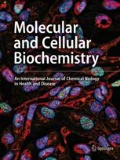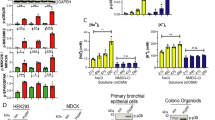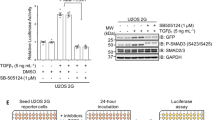Abstract
Perturbations of the extracellular ionic content by different hypo- or hyperosmolar stimuli initiate stress responses to maintain cell viability that include activation of Mitogen Activated Protein Kinases (MAPK) in cell lines derived from kidney epithelium. When hyperosmolar conditions induced by different salts occurred in the extracellular environment of tumor-derived cell lines, they activated the Extracellular Regulated Kinase 1/2 by increasing its phosphorylation steady-state on Thr202/Tyr204 in a time- and dose-dependent manner. It was found that Extracellular Regulated Kinase 1/2 activation is a consequence of selective phosphorylation by mitogen-activated protein kinase/ERK kinase. Changes in cell shape or in tubulin or actin cytoskeletal structure were not found, although cell growth arrest was observed as well as induction of apoptosis and modified cell migration ability that were dependent upon Extracellular Regulated Kinase 1/2 activation evidencing a critical role for the Extracellular Regulated Kinase 1/2 in mediating survival of cells in hyperosmotic conditions.
Similar content being viewed by others
References
Parker JC: In defense of cell volume? Am J Physiol 265: C1191–C1200, 1993
Burg MB: Molecular basis of osmotic regulation. Am J Physiol 268: F983–F996, 1995
Umenishi F, Schrier RW: Hypertonicity-induced aquaporin-1 (AQP1) expression is mediated by the activation of MAPK pathways and hypertonicity-responsive element in the AQP1 gene. J Biol Chem 278: 15765–15770, 2003
Kultz D, Madhany S, Burg MB: Hyperosmolality causes growth arrest of murine kidney cells. Induction of GADD45 and GADD153 by osmosensing via stress-activated protein kinase 2. J Biol Chem 273: 13645–13651, 1998
Casanovas O, Miro F, Estanyol JM, Itarte E, Agell N, Bachs O: Osmotic stress regulates the stability of cyclin D1 in a p38SAPK2-dependent manner. J Biol Chem 275: 35091–35097, 2000
Kerby GS, Cottin V, Accurso FJ, Hoffmann F, Chan ED, Fadok VA, Riches DW: Impairment of macrophage survival by NaCl: Implications for early pulmonary inflammation in cystic fibrosis. Am J Physiol Lung Cell Mol Physiol 283: L188–L197, 2002
Bustamante M, Roger F, Bochaton-Piallat ML, Gabbiani G, Martin PY, Feraille E: Regulatory volume increase is associated with p38 kinase-dependent actin cytoskeleton remodeling in rat kidney MTAL. Am J Physiol Renal Physiol 285: F336–F347, 2003
Berl T, Siriwardana G, Ao L, Butterfield LM, Heasley LE: Multiple mitogen-activated protein kinases are regulated by hyperosmolality in mouse IMCD cells. Am J Physiol 272: F305–F311, 1997
Itoh T, Yamauchi A, Miyai A, Yokoyama K, Kamada T, Ueda N, Fujiwara Y: Mitogen-activated protein kinase and its activator are regulated by hypertonic stress in Madin-Darby canine kidney cells. J Clin Invest 93: 2387–2392, 1994
Duzgun SA, Rasque H, Kito H, Azuma N, Li W, Basson MD, Gahtan V, Dudrick SJ, Sumpio BE: Mitogen-activated protein phosphorylation in endothelial cells exposed to hyperosmolar conditions. J Cell Biochem 76: 567–571, 2000
Roger F, Martin PY, Rousselot M, Favre H, Feraille E: Cell shrinkage triggers the activation of mitogen-activated protein kinases by hypertonicity in the rat kidney medullary thick ascending limb of the Henle’s loop. Requirement of p38 kinase for the regulatory volume increase response. J Biol Chem 274: 34103–34110, 1999
Powers C, Aigner A, Stoica GE, McDonnell K, Wellstein A: Pleiotrophin signaling through anaplastic lymphoma kinase is rate-limiting for glioblastoma growth. J Biol Chem 277: 14153–14158, 2002
Jentsch TJ, Stein V, Weinreich F, Zdebik AA: Molecular structure and physiological function of chloride channels. Physiol Rev 82: 503–568, 2002
Capasso JM, Rivard CJ, Enomoto LM, Berl T: Chloride, not sodium, stimulates expression of the gamma subunit of Na/K-ATPase and activates JNK in response to hypertonicity in mouse IMCD3 cells. Proc Natl Acad Sci USA 100: 6428–6433, 2003
Perez J, Perez F, Alvarruiz J, Losa A, Perez R, Ortega A, Andres E, Llamas F, Gomez C: HYPONATRAEMIA: Psychopatology, diagnostic and treatment. Archivos de Medicina 1:4, 2005
Author information
Authors and Affiliations
Corresponding author
Rights and permissions
About this article
Cite this article
Perez-Pinera, P., Menendez-Gonzalez, M., Valle, M.d. et al. Sodium chloride regulates Extracellular Regulated Kinase 1/2 in different tumor cell lines. Mol Cell Biochem 293, 93–101 (2006). https://doi.org/10.1007/s11010-006-2958-2
Received:
Accepted:
Published:
Issue Date:
DOI: https://doi.org/10.1007/s11010-006-2958-2




